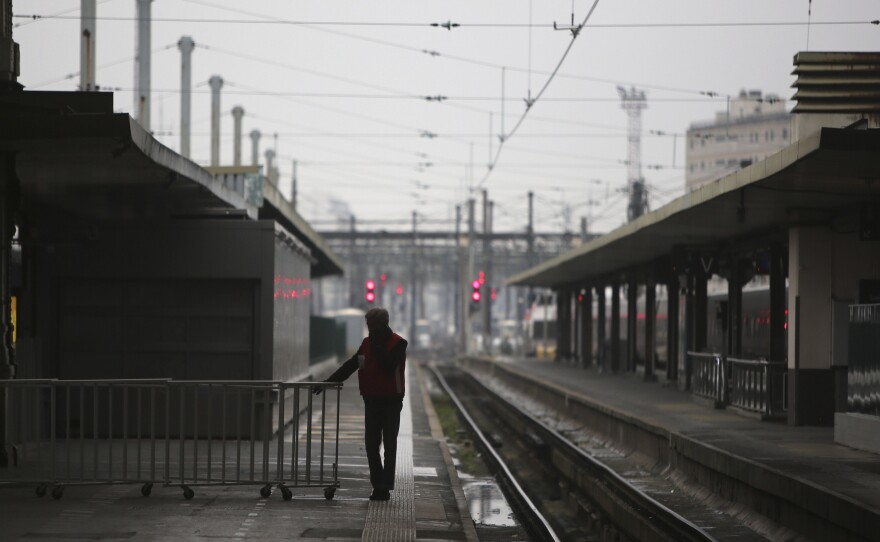On a typical Friday, the Gare de Lyon railway station in Paris would be positively seething with travelers hustling to catch their trains or greet arrivals. After all, it saw some 110 million passengers walk through its doors last year alone.
This, however, was not exactly a typical Friday in Paris.
Gare de Lyon, much like other stations across the city, including subway platforms, stood eerily empty Friday morning as a nationwide strike stretched into its second day. Similar scenes played out across France — where, one day after hundreds of thousands of people took part in massive protests, the general strike against a proposed pension overhaul has taken a quieter, but no less disruptive turn.
President Emmanuel Macron's government has released few formal details of the proposal, but the uncertainty around his reform effort has done little to mitigate the widespread anger it has elicited among union leaders, who have vowed to resist whatever he lays out. They expect the strike to continue at least through Monday.
Meanwhile, in Paris, the protests largely subsided, but the continued work stoppage meant "extreme disruptions" for metro and bus services in Paris, according to public transit authorities. Many schools in the capital also remained shuttered, with too many educators staying home in protest for classes to carry on as planned.
The disruptions also did not end at Paris' city limits. Aviation authorities projected the cancellation of at least a fifth of all incoming and outgoing flights at more than a half-dozen major airports across the country. France's national railway company, SNCF, estimates that a substantial chunk of its workforce is on strike, disrupting a vast majority of its popular routes across the country.
A handful of petrol refineries also expect to see operations impacted by strikes carried out by major industry unions.
Protesters object to the general reforms Macron has proposed for the country's convoluted pension system, which boasts 42 different plans usually determined by one's occupation and region. According to its backers, the idea is to consolidate the potpourri of pension plans into a universal, points-based system — though firm details of the proposal are not expected until at least next week.
Still, critics have seen no reason to wait for the new plan.
Dating back as far as last year, a series of opinion polls, including one issued last month, have consistently shown Macron's popularity to be underwater. And few voters have been willing to give the French president the benefit of the doubt as his ministers try to assert that the proposal offers a fairer, simpler alternative to the variety of plans in place now.
"Considering what Macron's already done to social rights, this gives us a good idea of what he's going to do with our retirement," retired engineer Christian Jeannot told NPR's Eleanor Beardsley on Thursday. "He's given millions to billionaires, and he wants to take away what little the working class has."
The protests recall a similar strike from 1995, which also sought to resist a pension reform plan. At the time, roughly 2 million people took part in protests lasting nearly three weeks. By the time the center-right government dropped the proposal, the leaders found their position badly undercut by the popular unrest.
Macron himself is no stranger to protests. Since he took office in 2017, France has witnessed the rise of the so-called gilets jaunes, or "yellow vests" — named for the neon safety vests often donned by protesters. The distinctive garment has become a mainstay in demonstrations against his environmental policies, attempts at tax hikes and economic inequality in France, in general.
Nevertheless, his government intends to carry on with the pension reform effort, if gradually. "I believe in social dialogue," Prime Minister Edouard Philippe said in an address Friday, according to a translation by Reuters. "I will never be in a logic of confrontation."
Copyright 2019 NPR. To see more, visit https://www.npr.org.






